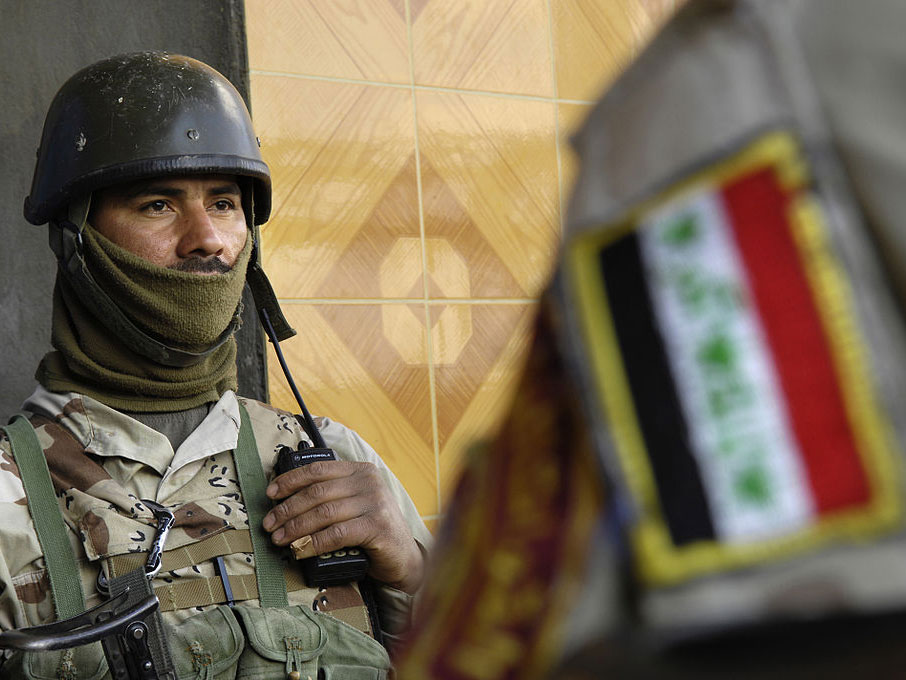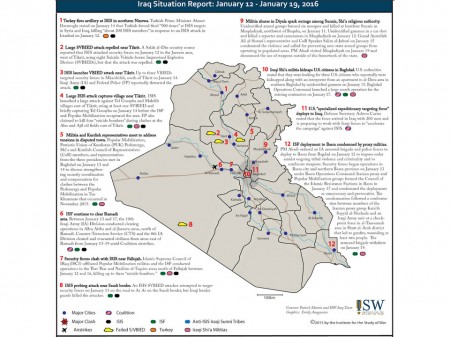
This article was originally published by the Institute for the Study of War on 20 January 2016.
Key Take-Away: Iraqi Shi’a militias significantly escalated their confrontation with the U.S. by kidnapping three American contractors and an interpreter in southern Baghdad on January 15, reportedly from the apartment of the interpreter. While no group has claimed responsibility, Iraqi Shi’a militias proliferate both the neighborhood of abduction, al-Dora, as well as Sadr City, the northeastern neighborhood to which the contractors were reportedly taken. Iranian proxy militias were responsible for kidnapping American servicemen before the U.S. withdrawal in 2011. Iraqi Shi’a militias carried out similar kidnappings of Turkish citizens in Baghdad in September 2015 and Qatari citizens in Muthanna Province in December 2015. The kidnapping of the American citizens came just one day before the release of four American prisoners by Iran and two days before the imposition of additional sanctions on Iran in response to an Iranian ballistic missile test in October 2015. The timing of the kidnapping suggests that Iranian proxies did not kidnap the contractors in response to the additional sanctions, but did so in order to secure future leverage over the U.S. However, the possibility remains that an Iranian proxy militia may have conducted the kidnapping without a direct order from their supervisors in the Iranian Revolutionary Guard Corps – Quds Force (IRGC-QF). Regardless of intent, the kidnapping underscores the impunity with which Iranian proxies operate as well as the persistent threat they pose to U.S. personnel and interests.
The impunity of Iraqi Shi’a militias also undermines the cohesion and sovereignty of Prime Minister Haidar al-Abadi’s government. The Basra offices of major Iranian proxy militias, including Badr Organization, Kata’ib Sayyid al-Shuhada (KSAS), Kata’ib al-Imam Ali, and Nujaba Movement, rejected the presence of an armored brigade on January 17 that PM Abadi ordered to Basra to clamp down on rising criminality and tribal violence. The rejection came after a confrontation in Shatt al-Arab district in southeastern Basra Province, when gunfire was exchanged between KSAS members and an Iraqi Army unit at a checkpoint. A combination of the need for ISF units on the front lines against ISIS along with protests from proxy militias likely led to the brigade’s withdrawal from Basra on January 19. Iraqi Shi’a militia abuses against Sunnis in Muqdadiyah on January 11 also infuriated the Sunni Etihad bloc, who decided to boycott the government for at least two parliamentary and cabinet sessions and demanded the disarmament and disbandment of unspecified militias in Diyala province. Sunni boycotts of the government have led to little more than stalled draft laws in the past, and this one is unlikely to result in the passage of either priority legislation or reduced impunity of the Popular Mobilization due to the relative strength of the Iranian proxy militias. Nor will it result in a collapse in the government, as this would not assist Sunnis in passing important legislation. Nevertheless, the threat of a boycott is a serious demonstration of Sunni dissatisfaction with PM Abadi’s government, the persistent marginalization of Sunnis within government, and the ability of Iraqi Shi’a militias to operate nearly unchecked in Sunni areas of the country. Moreover, Sunni politicians may escalate their demands if human rights violations by Iraqi Shi’a militias continue or if Shi’a parties continue to block legislation prioritized by Sunni parties in the Council of Representatives.

Patrick Martin is a Research Assistant at the Institute for the Study of War where he focuses on political and security developments in Iraq.
For more information on issues and events that shape our world, please visit ISN Security Watch or browse our resources.

